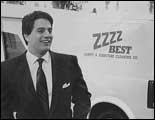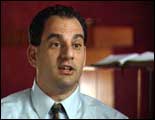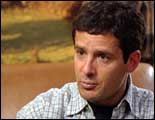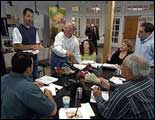FEATURE . Corporate Ethics
BOB ABERNETHY, anchor: The boardroom scandals of the past year have cost billions of dollars, ruined some companies, hurt employees and shareholders, and shaken public confidence in corporate America. But that’s not the whole picture. Lucky Severson reports on companies in which ethics remains an essential part of the business plan.
 LUCKY SEVERSON: You may remember Barry Minkow from the “rip-roaring 1980s,” said to be the youngest entrepreneur, at 19, ever to take a company public. His carpet-cleaning company, called ZZZ Best, was once valued at $300 million. But Minkow was scamming investors and creditors, and he spent seven and a half years in prison.
LUCKY SEVERSON: You may remember Barry Minkow from the “rip-roaring 1980s,” said to be the youngest entrepreneur, at 19, ever to take a company public. His carpet-cleaning company, called ZZZ Best, was once valued at $300 million. But Minkow was scamming investors and creditors, and he spent seven and a half years in prison.
BARRY MINKOW: I always wondered if that next call was the call to say “We know you are a crook, Barry, you are caught.” So the first good night’s sleep I got was prison.
SEVERSON: So you were feeling guilty during this?
Pastor MINKOW: Yeah, I knew who I was at night when nobody was looking.
 SEVERSON: And now he is Pastor Barry Minkow of the Community Bible Church in San Diego, preaching the gospel of personal responsibility. And he conducts what he calls “fraudits” — a sort of “scared straight” program for corporate managers — dressed in his orange prison garb.
SEVERSON: And now he is Pastor Barry Minkow of the Community Bible Church in San Diego, preaching the gospel of personal responsibility. And he conducts what he calls “fraudits” — a sort of “scared straight” program for corporate managers — dressed in his orange prison garb.
Pastor MINKOW: I go in and I say “I got wiped out. The government verifies I didn’t keep no money. I did seven and a half, and this is how I was dressed. My roommate was in for murder. Don’t do crime, and by the way now, if you steal money, you are going to do 18 years.”
SEVERSON: The corporate scandals of the 80s were bad enough, but now they just keep on coming. Losses have grown from millions to billions, derailed the stock market, and wiped out the retirement savings of thousands of Americans.
Professor LAURA NASH (Business Ethicist, Harvard Business School): Some of the behaviors that we heard about were clearly cases of theft, clearly cases of abusing people’s trust, and it’s pretty degrading activities when you think about it.
SEVERSON: And Laura Nash has thought about it a great deal. She’s a business ethicist at Harvard Business School, and she says it’s extremely important to punish white-collar crime.
Prof. NASH: If we see bloodshed, we are obviously quicker to punish harsher in terms of our punishment. And white-collar crime appears to be a bloodless crime, so I think it’s almost instinctive to look the other way. But when we do that we create a system that leaves many, many people out; it is basically an act of injustice.
SEVERSON: Pete Peterson, a former commerce secretary and head of the Blackstone Group, a prominent investment firm, has always been an outspoken advocate of strong corporate ethics.
PETE PETERSON (Chairman, Blackstone Group): We now have a situation where 80 percent of Americans either believe that all executives or most executives are practicing illicit, unattractive, undesirable behavior.
SEVERSON: Peterson is now a co-chairing a task force of business leaders and investors searching for solutions to what went wrong and how to fix it.
Mr. PETERSON: Some wonder whether something has happened to the ethic of this country, which is, if it’s not illegal, it’s OK. Some wonder if it’s part of the entitlement ethic: “Wall Street is making a lot of money, why don’t I make a lot of money?” It’s about what’s right and what is wrong.
SEVERSON: Of course, most companies are not corrupt, not skewing the bottom line. And there are companies who believe they can do well by doing good, by actually serving customers, nurturing employees, and building communities.
Case in point: a privately held company called The Container Store, always ranked near the top of FORTUNE magazine’s 100 best companies to work for. Over the past 24 years, the company has posted average annual sales increases of at least 20 percent, pays its employees above average, has extremely low turnover, and approaches customers with the notion that helping them is a moral imperative.
But is it possible for the publicly owned companies, who have to respond to pressures from shareholders to produce rich dividends and a strong bottom line — is it possible for a company that makes doing good a corporate goal [to] do well? The answer is yes. In fact, it’s the creed at the international outdoor wear company known as Timberland.
Rosemary Chang is a new employee at the Timberland headquarters here in Stratham, New Hampshire, one of 6,000 employees worldwide.
(to Ms. Chang): How was their offer different from any other offer?
ROSEMARY CHANG: They talked a lot about family. They talk about community service. They talked a lot about being good and doing right and all the bold goals.
SEVERSON: Bold goals, such as supporting a program called “Citi-Year” where young people, like these in training from all over the U.S., spend a year working in the inner cities.
 The company offers all employees a paid week off each year to work on community projects like planting trees, building houses, and rebuilding communities. For Karen Thurston, an e-commerce manager, serving communities changed her life.
The company offers all employees a paid week off each year to work on community projects like planting trees, building houses, and rebuilding communities. For Karen Thurston, an e-commerce manager, serving communities changed her life.
KAREN THURSTON: I was personally transformed because it went from a service project where we were painting a house to more of a service project where we really were helping a community.
I have had practice leading a group of 120 people at a full-day project, and that kind of experience pays off back at the office.
SEVERSON: Back at the office, Claire Spofford, vice president of global marketing, is meeting with the company’s third-generation president, Jeff Swartz, who’s the motivating force here with a philosophy that he says draws from his Jewish faith.
 JEFF SWARTZ: It’s not that you first do well, you take care of yourself, and then you do good. You must do well and do good simultaneously, that’s the challenge.
JEFF SWARTZ: It’s not that you first do well, you take care of yourself, and then you do good. You must do well and do good simultaneously, that’s the challenge.
SEVERSON: In-house surveys have shown that customers will buy products from companies they think are serving more than just the bottom line.
CLAIRE SPOFFORD: We feel that we have empirical evidence that linking commerce and justice to our values as a company and to our value proposition as a brand delivers returns, but at the same time, you can’t take your eye off. We are a public company, we have to manage the bottom line.
Prof. NASH: What I don’t think we should do is create [a] fairy tale here that all goodness is rewarded, good things happen to good people all the time. That isn’t true. Many companies that have taken very strong social responsibility stands have not always done well in the marketplace.
 SEVERSON: Jeff Swartz says it’s not good enough for a company to make a good product — they have to be a good company.
SEVERSON: Jeff Swartz says it’s not good enough for a company to make a good product — they have to be a good company.
Mr. SWARTZ: Why is it that a consumer says, “Nice jacket, good price, I’ll buy it”? Why don’t they say, “Nice jacket, good price, where was it manufactured?”? The reason why there isn’t more engaged corporate behavior is because the market doesn’t demand it. And I believe the market will, the market is starting to, and I think that’s a good thing.
SEVERSON: Most everyone we spoke with agrees that the new, tougher corporate accountability laws passed by Congress will help. They also agree that corporate leaders like Jeff Swartz will need to lead the way and that customers and shareholders alike should demand more ethical responsibility, even when the times are good.
For RELIGION & ETHICS NEWSWEEKLY, I’m Lucky Severson in Stratham, New Hampshire.






